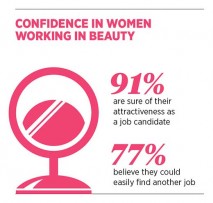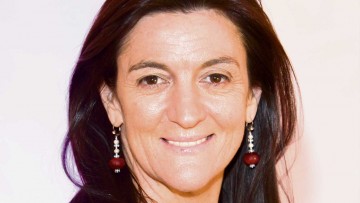The beauty industry is worth £17 billion to the UK economy and employs more than a million people, predominantly women. Jobs are created across all sectors for manufacturers, scientists, executives, marketers, accountants, beauticians and more.
Over 620,000 businesses in the UK are owned by women, many within the beauty industry, and it is predicted that by 2025 women will account for 60 per cent of all personal wealth. However, elsewhere in business only 17 per cent of FTSE 100 directors are women and 36 per cent of finance associates.
The beauty employment market is certainly varied with many women starting on the shop, office or salon floor. Sophie Ford, 23, a trainee hairdresser at Tai Hair & Beauty salon in Hove, says: “There are more women in beauty because women understand beauty. I chose hairdressing as talking to different people appealed to me, rather than being at a desk and speaking to the same people every day. Plus I live at home so can afford to live on an apprentice’s wage. But I have a trade and qualifications that I can travel the world with.”
Another industry newbie Rosie Saxcoburg, 22, junior account manager, says: “I’m fortunate to be one of those people who loves what they do. It’s definitely a female- dominated industry, but in my experience this has only proven to be a supportive and encouraging environment.”

Navigating beauty employment
The first survey of its kind by CEW (Cosmetic Executive Women), a professional organisation with more than 1,000 members in the UK beauty industry, and recruitment consultancy 24 Seven provides information to help job seekers and hirers navigate the beauty employment market.
It is important to grow your own talent and support their development in order to promote a career progression in the business
Caroline Neville, president of CEW, says the survey for the UK Beauty Salary and Job Market Report was sent to CEW members at more than 500 companies, across all beauty disciplines, as well as to 24 Seven’s network of beauty talent.
 So what did the survey find among employees? Bringing home more money was the top reason for worker dissatisfaction, but on average beauty industry employees in new jobs did get up to 12 per cent pay increases. Respondents also said they seek out employers who provide professional development, optimal growth potential and clear career direction. Plus two in three currently employed beauty professionals are planning a job move in the next 12 months.
So what did the survey find among employees? Bringing home more money was the top reason for worker dissatisfaction, but on average beauty industry employees in new jobs did get up to 12 per cent pay increases. Respondents also said they seek out employers who provide professional development, optimal growth potential and clear career direction. Plus two in three currently employed beauty professionals are planning a job move in the next 12 months.
Beverley Radford, vice president of executive search and global accounts at 24 Seven, comments: “As 60 per cent of those in the survey want training and 54 per cent actively look for training, this means it is a big part of staff retention. Companies can look to do a lot of staff skills development without a huge investment and this is much cheaper than re-hiring.”
Gill Smith, managing director of The Perfume Shop, also feels training is paramount and says of the survey findings: “It is important to grow your own talent and support their development in order to promote a career progression in the business.”
Annie Murphy, commercial director of Boots UK, agrees with Ms Radford that digitally skilled candidates are in big demand. “We are recruiting quite heavily in a number of beauty areas. However, the greatest need has been within digital and omnichannel, as well as brand development.”
Female-dominated
Susan Harmsworth, 70, the founder of ESPA, thinks the best teams include men and women. “I feel strongly about women and empowering women, but you don’t get all those hormones running amok if you include men,” she says. Of ESPA employees, 75 per cent are female and are in a training and development role, spa design and store staff, with men mostly in IT, accounts, manufacturing and logistics.
Janet Saunders, vice president and general manager of Clinique, Darphin and Origins at Estée Lauder, says the nature of the industry tends to attract women. “In Clinique, we have a fantastic track record of employing women and offering career development, which allows people to move from the counter to the board,” she says. “We don’t have quotas in senior leadership positions, but in the UK we have a 100 per cent female leadership team. Clinique also has leave for fertility treatments, as well as maternity, paternity and child-adoption policies.”
Maleka Dattu, owner of Merumaya Skincare, says: “Women are bigger users of cosmetics and have a greater understanding of the emotional connection that needs to be made with the customer. Women are generally better communicators too.” But she concedes: “There are few part-time jobs in management, crèche facilities or allowances.”
Ms Harmsworth adds: “It creates more discontent if colleagues run out the door at 5pm to attend to children and you have to be careful with an international company that you don’t end up with everyone part time or on job shares.”
Noella Gabriel, managing director of Elemis, where 91 per cent of staff are female, sums up why women are in the lead: “Women are very powerful and run the industry – we understand what women want, and the process of ageing and maturity. We know what the demands on the skin are for women. We come from a knowledgeable place and we are good listeners.”


